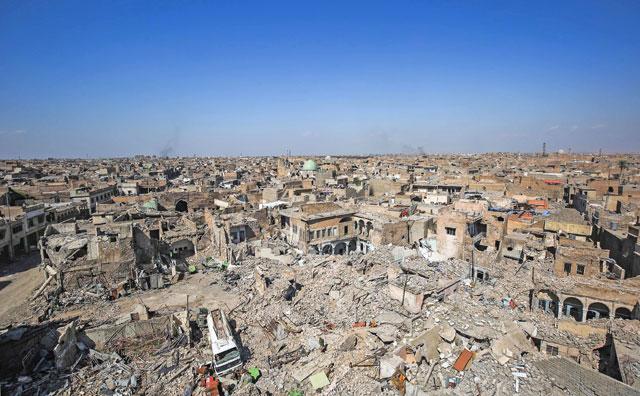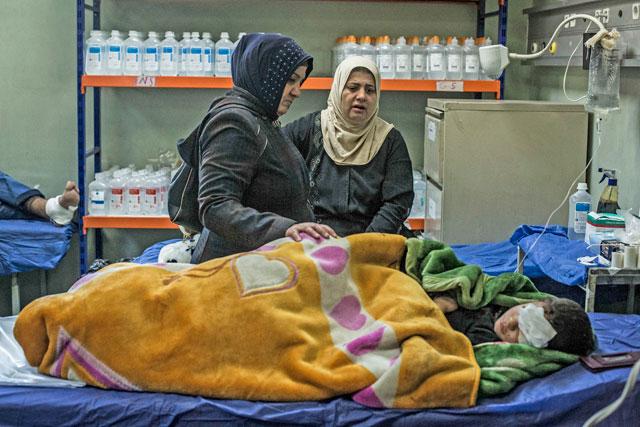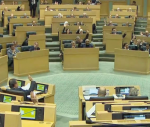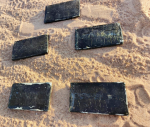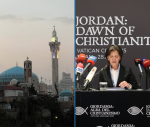You are here
Iraqis in Mosul markets both fear and hope for the future
By AFP - Jul 30,2017 - Last updated at Jul 30,2017
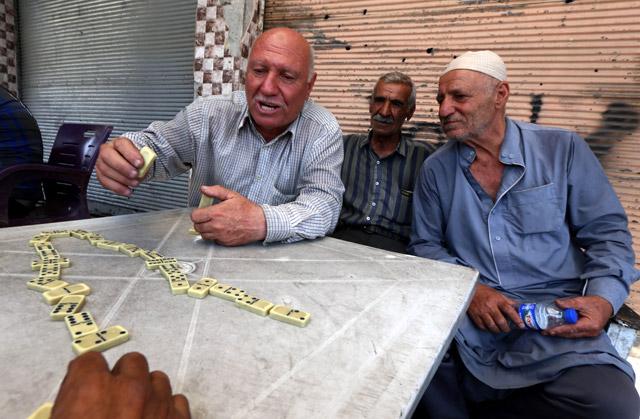
Iraqi men play dominos at a cafe in the old city in west Mosul on Sunday (AFP photo)
MOSUL, Iraq — Iraqi merchants and shoppers jostle in the lively open-air market of Gogjali on the eastern edges of Mosul, their voices often drowned out by the honking horns of cars.
"Mosul will never be the same again," sighs Yunes Abdullah, a 60-year-old former soldier who set up a stall to repair televisions and other electrical appliances.
Merchants and shoppers in Gogjali, one of the first areas to be retaken from the extremists by Iraqi forces when they launched an offensive last October to recapture the country's second city, have mixed feelings about what the future holds.
Some people blame the authorities for not doing enough to tackle the mammoth task of reconstructing the city, while others pray that the international community will be generous with funding.
"The government isn't doing anything. It's the people who clean the streets. Nothing has been rebuilt, not roads and not buildings," says Abdullah.
His business partner Amar Akram agrees.
"My house was destroyed, and I don't have any money to rebuild it. I don't know who to turn to for help. Who should I speak to? There are thousands of people like me," he says.
"They [the authorities] don't help us because in their eyes we are all Daesh," Akram adds, using an Arabic acronym for the ISIS terror group.
Similar accusations can be heard throughout the market.
"They say we helped Daesh, but they know very well who allowed them to enter" the city, says a young tea-seller.
In June 2014, Daesh seized Mosul and routed Iraqi forces from the area, after what a parliamentary inquiry later found was a gross mismanagement of the crisis by Iraqi officials, who ignored ample warnings of an impending attack on the city.
Three years later, tens of thousands of members of the Iraqi forces backed by Western warplanes and other international assistance retook Mosul after months of fierce fighting.
On July 10, victory was officially declared in the city, which is divided by the Tigris river into eastern and western parts.
'God willing'
In a part of the Gogjali Market where merchants sell mobile phones and spare parts for cars, Abdullah says he mistrusts the authorities and claims they "embezzle" government funds.
But he does admit that "they are good at security".
A client who overhears him jumps into the conversation with her own theory of how things should play out.
"The Americans must stay. They can influence things. When they speak we listen to them, unlike the Arabs who don't respect each other," says the seamstress in her 40s.
She says she had to "start back from zero" after fleeing the west side of Mosul, where Iraqi forces fought some of the fiercest battles before they could oust the extremists.
Several kilometres away, life has also returned to the covered Nabi Yunis Market in the city's eastern side.
A wide array of merchandise is available, from clothing to fruit and vegetables, cheap perfume, hair dyes and remedies for losing weight in packaging showing svelte female bodies.
"There are more products and the prices have become reasonable," says one male shopper. "Under IS [Daesh], things were three times more expensive."
Behind mounds of grapes, apples and pomegranates, Mohammed Jassem says people must be patient.
"The government has a lot to do, and time is needed to reorganise things and for life to return to normal," he says.
"The priority should be to infrastructure: rebuilding hospitals, bridges and roads."
Everyone around him, merchants and shoppers, uses the same phrase: "Inshallah" — "God willing" in Arabic — security and reconstruction will work hand in hand to woo back hundreds of thousands of residents who fled Mosul.
"But financial aid from the international community will also be needed," says lingerie merchant Omar Hayani.
"The government does nothing" and is "letting people fend for themselves", says the 32-year-old, who however adds that life has improved since the extremists left.
"I now feel free and happy," he says.
Under the brutal rule of Daesh, Hayani was sentenced twice to being flogged because in his shop window he displayed "unauthorised" dummies, which he now proudly exhibits — draped in sheer dresses.
"We must hope," says Hayani.
"If things don't change, the war will return and everyone will leave."
Related Articles
MOSUL, Iraq — Haytham Salem has not spoken to his sister in years, but this is no ordinary family feud.
BAGHDAD — Mortar fire and car bombs killed more than 30 people including aid workers near Mosul Thursday as Iraqi forces battled to seize th
MOSUL, Iraq — Standing at the gate of his house in Iraq’s war-torn city of Mosul, Muwaffaq Al Obeidi watches as waves of displaced residents


